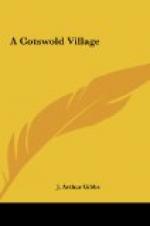His eldest son, Tom—our old friend the keeper—generally stands umpire; he is not so useful to his side as village umpires usually are, because he hasn’t got the moral courage to give his side “in” when he knows perfectly well they are “out.” The other day, however, he made a slight error; for, on being appealed to for the most palpable piece of “stumping” ever seen in the cricket field, the ball bouncing back on to the wicket from the wicket-keeper’s pads while the batsman was two yards out of his ground, he said, “Not out; it hit the wicket-keeper’s pads.” He imagined he was being asked whether the batsman had been bowled, and it never occurred to him that you could be “stumped out” in this way. Altogether, Cotswold cricket is great fun.
The district is full of memories of the prehistoric age, and in certain parts of the country prehistoric cricket is still indulged in. Never shall I forget going over to Edgeworth with the Winson Cricket XI. to play a grand match at that seat of Roman antiquities. The carrier drove us over in his pair-horse brake—a rickety old machine, with a pony of fourteen hands and a lanky, ragged-hipped old mare over sixteen hands high in the shafts together. A most useful man in the field was the honest carrier, whether at point or at any other place where the ball comes sharp and quick; for, to quote Shakespeare,
“he
was a man
Of an unbounded stomach.”
The rest of our team included the jovial miller; two of the village carpenter’s sons—excellent folk; the village curate, who captained the side, and stood six feet five inches without his cricket shoes; one or two farmers; a footman, and a somewhat fat and apoplectic butler.
The colours mostly worn by the Winson cricketers are black, red, and gold—a Zingaric band inverted (black on top); their motto I believe to be “Tired, though united.”
As the ground stands about eight hundred feet above sea level, all of us, but especially the fat butler, found considerable difficulty in getting to the top of the hill, after the brake had set us down at the village public. But once arrived, a magnificent view was to be had, extending thirty miles and more across the wolds to the White Horse Hill in Berkshire. However, we had not come to admire the view so much as to play the game of cricket. We therefore proceeded to look for the pitch. It was known to be in the field in which we stood, because a large red flag floated at one end and proclaimed that somewhere hereabouts was the scene of combat. It was the fat butler, I think, who, after sailing about in a sea of waving buttercups like a veritable Christopher Columbus, first discovered the stumps among the mowing grass.




